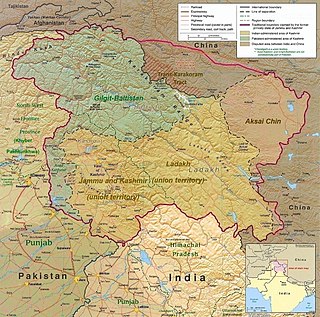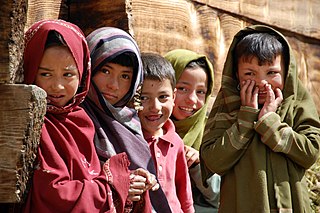Related Research Articles

Ladakh is a region administered by India as a union territory and constitutes an eastern portion of the larger Kashmir region that has been the subject of a dispute between India and Pakistan since 1947 and India and China since 1959. Ladakh is bordered by the Tibet Autonomous Region to the east, the Indian state of Himachal Pradesh to the south, both the Indian-administered union territory of Jammu and Kashmir and the Pakistan-administered Gilgit-Baltistan to the west, and the southwest corner of Xinjiang across the Karakoram Pass in the far north. It extends from the Siachen Glacier in the Karakoram range to the north to the main Great Himalayas to the south. The eastern end, consisting of the uninhabited Aksai Chin plains, is claimed by the Indian Government as part of Ladakh, but has been under Chinese control.

Balti is a Tibetic language natively spoken by the ethnic Balti people in the Baltistan region of Gilgit-Baltistan, Pakistan, Nubra Valley of the Leh district and in the Kargil district of Ladakh, India. The language differs from Standard Tibetan; many sounds of Old Tibetan that were lost in Standard Tibetan are retained in the Balti language. It also has a simple pitch accent system only in multi-syllabic words while Standard Tibetan has a complex and distinct pitch system that includes tone contour. Due to effects of dominant languages in Pakistani media like Urdu, Punjabi and English and religious impact of Arabic and Persian languages, Balti, like other regional languages of Pakistan, is continuously expanding its vocabulary base with loanwords.

Baltistan also known as Baltiyul or Little Tibet, is a mountainous region in the Pakistani-administered territory of Gilgit-Baltistan and constitutes an northern portion of the larger Kashmir region that has been the subject of a dispute between India and Pakistan since 1947. It is located near the Karakoram and borders Gilgit to the west, China's Xinjiang to the north, Indian-administered Ladakh to the southeast, and the Indian-administered Kashmir Valley to the southwest. The average altitude of the region is over 3,350 metres (10,990 ft). Baltistan is largely administered under the Baltistan Division.

Kargil district is a district in Indian-administered Ladakh in the disputed Kashmir-region. It is one of the two districts comprising the Indian-administered union territory of Ladakh. The district headquarters are in the city of Kargil. The district is bounded by the Indian-administered union territory of Jammu and Kashmir to the west, the Pakistani-administered administrative territory of Gilgit–Baltistan to the north, Ladakh's Leh district to the east, and the Indian state of Himachal Pradesh to the south. Encompassing three historical regions known as Purig, Dras and Zanskar, the district lies to the northeast of the Great Himalayas and encompasses the majority of the Zanskar Range. Its population inhabits the river valleys of the Dras, Suru, Wakha Rong, and Zanskar.

Skardu is a city located in Pakistan-administered Gilgit-Baltistan in the disputed Kashmir region. Skardu serves as the capital of Skardu District and the Baltistan Division. It is situated at an average elevation of nearly 2,500 metres above sea level in the Skardu Valley, at the confluence of the Indus and Shigar rivers. The city is an important gateway to the eight-thousanders of the nearby Karakoram mountain range. The Indus River running through the region separates the Karakoram from the Ladakh Range.

The Baltis are a Tibetic ethnic group who are native to the Pakistani-administered territory of Gilgit−Baltistan and the Indian-administered territory of Ladakh, predominantly in the Kargil district with smaller concentrations present in the Leh district. Outside of the Kashmir region, Baltis are scattered throughout Pakistan, with the majority of the diaspora inhabiting prominent urban centres such as Lahore, Karachi, Islamabad and Rawalpindi.

Turtuk is a village and the headquarters of an eponymous community development block in the Indian union territory of Ladakh. It is a small village sandwiched between the Karakorum Range and the Himalayas, and one of the northernmost villages of India, close to the Line of Control between India and Pakistan. Turtuk is situated in the Nubra tehsil of the Leh district, on the banks of the Shyok River. Geographically, the village is in the Baltistan region, which has been under Pakistani administration, except for five villages of the Turtuk block which are part of India. These villages form the only region in India populated by Balti people. Turtuk is known for its fruit, especially apricots.

Chorbat Valley is a section of the Shyok river valley divided between Pakistan-administered Gilgit-Baltistan and Indian-administered Ladakh. The Pakistan-administered portion is in the Khaplu tehsil of Ghanche District in Gilgit–Baltistan, and the Indian-administered portion is in the Nubra tehsil, Leh district of Ladakh. Chorbat stretches from the edge of Khaplu to the Chalunka village of Nubra.
T. Senka Ao is a journalist from the Indian state of Nagaland. Senka Ao is best known for his work as the Editor-in-Chief of the "Ao Milen", the first newspaper in Nagaland established in 1933 and the first newspaper ever to be published in the local Ao language. During the period of his edittorship, Senka Ao created the "Alokba" character famous for his witty commentary on social and current issues. Senka Ao has contributed several articles to various publications and has authored nine books in the Ao language. Two of his books Kongro Lijen and Kishi Tezulen are in the process of translation into English. Senka Ao's books have been included in the syllabus of the Ao language in ICSE and ISC Board New Delhi, and up to class 10 under Nagaland Board of School Education. He is an examiner of Arrangtet Examination which is the highest Ao language degree.
Harmohinder Singh Bedi is an Indian academician, academic administrator and author. Since 4 July 2018, he has been serving as the Chancellor of the Central University of Himachal Pradesh.
Jagjit Singh Dardi is an Indian journalist and an educationist from Punjab. He is the Editor-in-Chief of the Punjabi language daily newspaper Chardikala, a newspaper that was started in 1977. In 1970 Dardi started a fortnightly Charhdikala Marg, whose Founder Editor was his father G Harnam Singh. This fortnightly paper was converted into a daily newspaper in 1977. He is the Chairman of the Punjabi news channel Chardilkala Time TV. He is also the Chairman of Sri Guru Harkrishan Group of Institutes, a chain of higher education institutes. He was awarded Padma Shri in the year 2022 for his services in national integration, communal harmony, contributions in the field of media, education and promotion of Punjabi language, culture and heritage.In 2022, Department of Public Relations Chandigarh administration announced Dardi as a Chairperson of the Chandigarh Press Accreditation Committee. Punjabi Media house Nirpakh Post and published a biography of Dardi.
Arjun Singh Dhurve is a folk dancer and a retired teacher from the Dindori district of the Indian State of Madhya Pradesh. He is famous for popularising Baiga folk songs and dance. Baiga Pardhauni dance is the main dance of the Baiga tribe. In this form of dance, the performers wear the masks of peacocks, elephants, horses, etc.
Dhaneswar Engti is a poet-author from the Indian State of Assam promoting the use of the endangered Karbi language spoken by the Karbi people of Northeastern India. Engti has authored 19 books and written around 100 songs in the Karbi language. He has also served as the Joint Secretary of Karbi Anglong Autonomous Council. In the year 2022, Govt. of India conferred on him the Padma Shri award for his work towards the preservation and advancement of indigenous languages.
Narasingha Prasad Guru is an author and a lyricist from the Indian State of Odisha. He is a pioneer and a promoter of the Koshali language, also known as the Sambalpuri language, which is a language spoken in the western parts of Odisha. He has composed over 10 books in this language and composed around 500 songs. He has also compiled a dictionary of the Koshali language.
Avadh Kishore Jadia is a poet and author in the Bundeli language and the Braj language from the Chhatarpur district in the Indian State of Madhya Pradesh. He was also an Ayurveda medical practitioner in the Madhya Pradesh Govt Service. In the year 2022, Govt of India honored him by conferring the Padma Shri award for his contributions as an author in the Bundeli and Braj languages.
V L Nghaka is an academician from the Indian State of Mizoram known for his efforts for the propagation and development of the Hindi language in Mizoram. He authored the first Hind-Mizo dictionary and got it published in the year 1965. In the year 2022, Govt of India honoured V L Nghaka by conferring the Padma Shri award for his contributions to literature and education. As per his citation for Padma Shri award, "He built a cultural bridge between Hindi and Mizo language by drafting a Hindi-Mizo dictionary. As an interpreter, he was instrumental in bringing the government and Mizo people closer.”
Chirapat Prapandvidya is a Thai archaeologist, Sanskrit scholar and an Indologist. He was the founder and the first Director of Sanskrit Studies Centre at Silpakorn University in Bangkok. He has also published over a hundred articles on Sanskrit and Indology. In the year 2022, Govt of India honoured Chirapat Prapandvidya by conferring the Padma Shri award for his contributions to literature and education.
Sheesh Ram is an ex-soldier of the Indian Army and a painter specialising in depicting themes like national integration, women empowerment, Indian warfare, terrorist attacks in India and the world. After 40 years of service in the Indian Army he retired in the year 2007. While he was in service and also after retirement he has been creating paintings on various themes like battle scenes, patriotism and soldiers' sacrifices. Many of his paintings have been installed in the Art Gallery of the Army. He had also conducted an exhibition of his paintings in Dubai. He has also designed many medals for the Army. Medals designed by him are still used for conferring Army, Air Force, Navy and Paramilitary honours. In the year 2022, Govt of India honoured Sheesh Ram by conferring the Padma Shri award for his contributions to art.
Sakini Ramachandraih is a vocal folk singer and Dhol player from the Bhadradri town in the Telangana State in India. He is known for his expertise in "Kanchumelam-Kanchuthalam" an art form particularly identified with the Koya tribal community in Telangana and Andhra Pradesh. This art form is almost on the verge of extinction and Ramachandraih is the only surviving practitioner of the art who can narrate the history of the sacred festival "Sammakka Sarakka Jathara" in both Telugu and Koya languages in its full totality. In the year 2022, Govt of India honoured Ramachandraiah by conferring the Padma Shri award for his contributions to art.
Marol is a village situated near the confluence of the Suru River and the Indus River in the Kharmang District of Baltistan, Pakistan. It is close to the India–Pakistan border (LOC).
References
- 1 2 Ehsan Fazili. "Padma for unschooled Basharat can boost Balti language". Awaz: The Voice. Awaz: The Voice. Retrieved 16 February 2022.
- ↑ Reach Ladakh Correspondent. "One Day Balti Cultural and Literary Meet held in Kargil". Reach Kadakh Bulletin. Reach Ladakh. Retrieved 16 February 2022.
- ↑ "Padma Awards: Padma Awards honor heroes who have dedicated their lives to preserve languages, provide affordable medicine and much more". Bharat Times. Times of India. 26 January 2022. Retrieved 16 February 2022.
- ↑ AIR News (26 January 2022). "Padma Shri Award conferred to two persons from Ladakh for exceptional and distinguished services". Prasar Bharati. NewsOnAIR. Retrieved 16 February 2022.
- ↑ "Padma Awards 2022" (PDF). Padma Awards. Ministry of Home Affairs, Govt of India. Archived (PDF) from the original on 2022-01-25. Retrieved 11 February 2022.
- ↑ "Padma Awards 2022". Padma Awards. Ministry of Home Affairs, Govt of India. Archived from the original on 2022-01-29. Retrieved 11 February 2022.